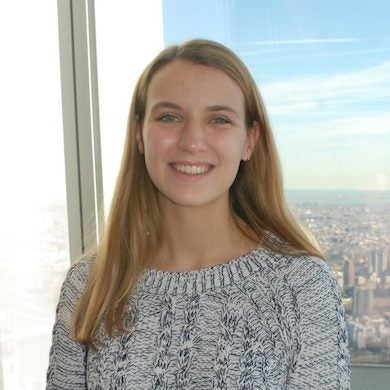Global Health Major Enjoys Coursework, Research, and Extracurricular Opportunities
October 26, 2020 – Julianne Bruggemann (NHS’23), a sophomore, is majoring in global health at the School of Nursing & Health Studies. She is enjoying the coursework and research opportunities, as well as participation in Best Buddies, Catholic Ministry, the Carroll Fellows Initiatives, and the Philodemic Society. About her future, she says, “So long as I can help people and work toward improving the health care system, I will be happy.”

Question: Where did you grow up, and how did you learn about Georgetown?
Bruggemann: I grew up in a suburb of New York City. I stumbled across Georgetown’s global health program in my sophomore year of high school by researching majors that combined my interests in international relations and biology. Looking at the global health program description, I remember thinking, ‘Yes, this is what I want!’
The following year, I toured campus, but accidentally stepped on the crest outside of Healy during the tour – I thought I was doomed! However, even an old superstition couldn’t keep me from Georgetown!
Question: What drew you to want to study in the health field?
Bruggemann: Studying in the health field just made sense to me. During high school, I worked with dog therapy teams at the local hospital, and the experience taught me how influential a health care worker is. The dogs and I visited everywhere from the ICU to the ER, and I talked with everyone from administrators to patients. I enjoyed getting to know everyone and listening to so many different stories.
Working in health care means I am a part, either directly or indirectly, of the stories that patients tell to their families, to their doctors, and even to the dog therapy volunteer. And I sincerely hope that I can somehow help make the stories positive ones.
Question: How are you enjoying the global health major?
Bruggemann: Recently, a professor asked me about what aspects of global health interested me the most, and in response, without realizing it, I listed every topic I’ve learned. In short, I have yet to come across a subject within global health that I dislike. I like how interdisciplinary the major is and how it allows me to partake in various topics of research.
Right now, I work on epidemiology research with Dr. Anca Dragomir, but I also am interested in health care economics and financing. I’m excited to explore more subjects as I progress through my coursework. I’m particularly looking forward to taking “Maternal and Child Health” and “Global Mental Health.”
Question: Tell us about the activities you are involved in at Georgetown.
Bruggemann: When I attended the CAB [Council of Advisory Boards] Fair, I spent two hours wandering around the tables and signed up for about 35 clubs. But amazingly, my schedule did not allow me to participate in all of the clubs I signed up for.
I did end up joining the Philodemic Society, which is where I’ve met some of my best friends. I’m also involved with Catholic Ministry and have enjoyed leading retreats and helping facilitate service events with Catholic Women. I also am a part of Best Buddies, an organization that helps create opportunities for people with intellectual and physical disabilities.
When I first heard about Carroll Fellows Initiatives (CFI), I was really excited by the opportunity to challenge how I think. In short, “Forum,” the seminar class that all fellows take in their sophomore year, teaches you how to think with intention. Dr. John Glavin, who runs this program, really pushes the fellows to go against conventional thinking that we’ve been taught in school.
Each week, he assigns a chapter of Thinking Fast and Slow by Daniel Kahneman, and we must record applications of psychological theories found in our day-to-day life. Along with this reading, we are assigned a task, typically analyzing a conversation we had or a text, such as Heart of Darkness.
Along with the assignments, I’ve also enjoyed the new friends I’ve made through the program, especially my mentorship group. CFI expands over the remaining three years of my undergraduate experience, and I look forward to working on my final project, which centers around my future goals and aspirations.
Question: What are your plans for the future?
Bruggemann: Over this past summer, I spent time talking with alumni and discussing career trajectories within health care. This has been really helpful in trying to discern what I want from my future. I am interested in pursuing a PhD in the future, but I plan to work in public health in between undergraduate and graduate school. The health care field is so vast, and I can see myself being happy working in various roles. So long as I can help people and work toward improving the health care system, I will be happy.
